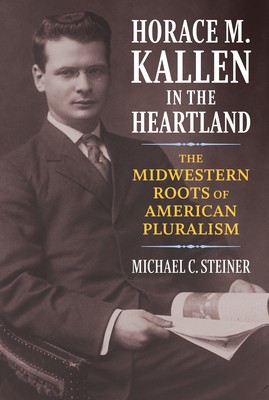
- We will send in 10–14 business days.
- Author: Michael C Steiner
- Publisher: University Press Of Kansas
- ISBN-10: 0700629548
- ISBN-13: 9780700629541
- Format: 16 x 23.4 x 2 cm, hardcover
- Language: English
- SAVE -10% with code: EXTRA
Reviews
Description
The Harvard-educated, Jewish American philosopher Horace Meyer Kallen (1882-1974) is commonly credited with the concept of cultural pluralism, which envisioned immigrant and minority groups cultivating their distinctive social worlds and interacting to create an inclusive, ever-changing true American culture. Though living and teaching in Madison, Wisconsin, when he developed this influential theory, Kallen's seven-year sojourn in the Midwest (1911-1918) rarely figures in accounts of the theory's origins. And yet, Michael C. Steiner suggests, the Midwest, far from being a mere interruption in Kallen's thought, was in fact the essential catalyst for the theory of cultural pluralism, a concept that continues to shape public debate a century later.
The Midwest in the first decades of the twentieth century was a youthful region experiencing massive immigration and the xenophobic fervor of approaching war. In this milieu Steiner locates a pervasive pluralist zeitgeist rife with urban- and rural-based intellectuals and public figures deeply critical of both the all-absorbing melting pot ideology and white racist Anglo-Saxon exclusionism. Early proponents of diversity who interacted with Kallen to forge a pluralist sensibility and ideology as the Midwest was becoming the nation's dominant region included public figures Hamlin Garland, Frederick Jackson Turner, and Jane Addams; African American activists Reverdy Ransom and Ida B. Wells; Norwegian American writers Ole E. Rølvaag and Waldemar Ager; and intellectuals Randolph Bourne and John Dewey. Tracing how Kallen's interaction with these figures and his regional experience expanded his vision and added the final touch and crucial spatial dimension to his theory, Horace M. Kallen in the Heartland enhances our understanding of cultural pluralism. The book has direct bearing on the present, as once again denunciation of diversity and mass migration challenge the tenets and advocates of pluralism.EXTRA 10 % discount with code: EXTRA
The promotion ends in 9d.04:14:06
The discount code is valid when purchasing from 10 €. Discounts do not stack.
- Author: Michael C Steiner
- Publisher: University Press Of Kansas
- ISBN-10: 0700629548
- ISBN-13: 9780700629541
- Format: 16 x 23.4 x 2 cm, hardcover
- Language: English English
The Harvard-educated, Jewish American philosopher Horace Meyer Kallen (1882-1974) is commonly credited with the concept of cultural pluralism, which envisioned immigrant and minority groups cultivating their distinctive social worlds and interacting to create an inclusive, ever-changing true American culture. Though living and teaching in Madison, Wisconsin, when he developed this influential theory, Kallen's seven-year sojourn in the Midwest (1911-1918) rarely figures in accounts of the theory's origins. And yet, Michael C. Steiner suggests, the Midwest, far from being a mere interruption in Kallen's thought, was in fact the essential catalyst for the theory of cultural pluralism, a concept that continues to shape public debate a century later.
The Midwest in the first decades of the twentieth century was a youthful region experiencing massive immigration and the xenophobic fervor of approaching war. In this milieu Steiner locates a pervasive pluralist zeitgeist rife with urban- and rural-based intellectuals and public figures deeply critical of both the all-absorbing melting pot ideology and white racist Anglo-Saxon exclusionism. Early proponents of diversity who interacted with Kallen to forge a pluralist sensibility and ideology as the Midwest was becoming the nation's dominant region included public figures Hamlin Garland, Frederick Jackson Turner, and Jane Addams; African American activists Reverdy Ransom and Ida B. Wells; Norwegian American writers Ole E. Rølvaag and Waldemar Ager; and intellectuals Randolph Bourne and John Dewey. Tracing how Kallen's interaction with these figures and his regional experience expanded his vision and added the final touch and crucial spatial dimension to his theory, Horace M. Kallen in the Heartland enhances our understanding of cultural pluralism. The book has direct bearing on the present, as once again denunciation of diversity and mass migration challenge the tenets and advocates of pluralism.

Reviews